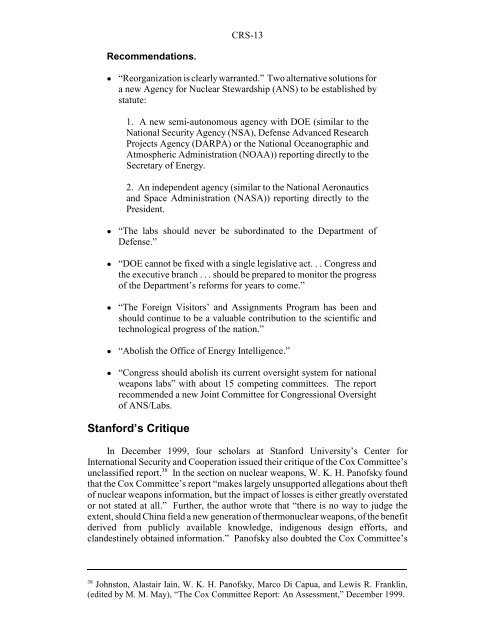China: Suspected Acquisition of U.S. Nuclear Weapon Secrets
China: Suspected Acquisition of U.S. Nuclear Weapon Secrets
China: Suspected Acquisition of U.S. Nuclear Weapon Secrets
Create successful ePaper yourself
Turn your PDF publications into a flip-book with our unique Google optimized e-Paper software.
Recommendations.<br />
CRS-13<br />
! “Reorganization is clearly warranted.” Two alternative solutions for<br />
a new Agency for <strong>Nuclear</strong> Stewardship (ANS) to be established by<br />
statute:<br />
1. A new semi-autonomous agency with DOE (similar to the<br />
National Security Agency (NSA), Defense Advanced Research<br />
Projects Agency (DARPA) or the National Oceanographic and<br />
Atmospheric Administration (NOAA)) reporting directly to the<br />
Secretary <strong>of</strong> Energy.<br />
2. An independent agency (similar to the National Aeronautics<br />
and Space Administration (NASA)) reporting directly to the<br />
President.<br />
! “The labs should never be subordinated to the Department <strong>of</strong><br />
Defense.”<br />
! “DOE cannot be fixed with a single legislative act. . . Congress and<br />
the executive branch . . . should be prepared to monitor the progress<br />
<strong>of</strong> the Department’s reforms for years to come.”<br />
! “The Foreign Visitors’ and Assignments Program has been and<br />
should continue to be a valuable contribution to the scientific and<br />
technological progress <strong>of</strong> the nation.”<br />
! “Abolish the Office <strong>of</strong> Energy Intelligence.”<br />
! “Congress should abolish its current oversight system for national<br />
weapons labs” with about 15 competing committees. The report<br />
recommended a new Joint Committee for Congressional Oversight<br />
<strong>of</strong> ANS/Labs.<br />
Stanford’s Critique<br />
In December 1999, four scholars at Stanford University’s Center for<br />
International Security and Cooperation issued their critique <strong>of</strong> the Cox Committee’s<br />
unclassified report. 38 In the section on nuclear weapons, W. K. H. Pan<strong>of</strong>sky found<br />
that the Cox Committee’s report “makes largely unsupported allegations about theft<br />
<strong>of</strong> nuclear weapons information, but the impact <strong>of</strong> losses is either greatly overstated<br />
or not stated at all.” Further, the author wrote that “there is no way to judge the<br />
extent, should <strong>China</strong> field a new generation <strong>of</strong> thermonuclear weapons, <strong>of</strong> the benefit<br />
derived from publicly available knowledge, indigenous design efforts, and<br />
clandestinely obtained information.” Pan<strong>of</strong>sky also doubted the Cox Committee’s<br />
38 Johnston, Alastair Iain, W. K. H. Pan<strong>of</strong>sky, Marco Di Capua, and Lewis R. Franklin,<br />
(edited by M. M. May), “The Cox Committee Report: An Assessment,” December 1999.
















